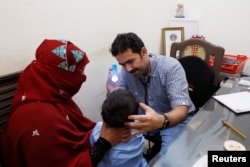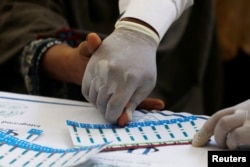A town in Pakistan is struggling to deal with patients infected with HIV, the virus that can lead to Acquired Immunodeficiency Syndrome, known as AIDS.
Nearly 700 HIV cases have been reported in the town of Ratodero, in Sindh Province, since April. Most of the patients are children.
“For me it was impossible to imagine,” said Nazeer, recalling the day a doctor said his 16 month-old girl had tested positive for HIV.
“I told him ‘are you joking with me, how can she have HIV?,’” he said. Nazeer spoke with the Reuters news agency from his home in Ratodero, about 500 kilometers from Karachi, Pakistan’s largest city.
His daughter is receiving treatment, he said, adding he did not know how she was infected.
Health officials say 681 people have tested positive for HIV in the town since April 25. Of that number, 537 are children.
Thousands of people have taken an HIV test at Ratodero’s only testing center in a government hospital. Others have been tested at private medical centers.
About 60% of Ratodero patients were infected by reused medical instruments, such as needles and syringes, or through donated blood, says Doctor Sikander Memon. He is head of the province’s AIDS control program.
Police and doctors carried out an investigation. They found that 123 HIV patients had been treated by the same doctor before they were infected.
Dr. Muzaffar Ghanghro was arrested on April 30 and has been charged with unintentional murder, police said.
Reuters was not permitted to contact Ghangro in jail and was not able to contact his lawyer.
‘Sold all my valuables’
Pakistan has about 163,000 HIV and AIDS patients, said Zafar Mirza, a health adviser to Prime Minister Imran Khan.
At Pakistan’s request, the World Health Organization and the United States Centers for Disease Control and Prevention have sent experts to the area.
Pakistan’s government has ordered 50,000 HIV testing kits and is setting up three treatment centers. Adult patients are receiving anti-retroviral drugs, and medicines have been ordered for children, Mirza said.
The Ratodero cases are evidence of the current state of healthcare in Pakistan, a nation of 208 million people. Almost a third of the population lives on less than $3.20 a day. Many Pakistanis cannot pay for costly medical tests or drugs.
Few families can pay for proper treatment of HIV, which usually involves trips to Karachi.
“I have sold all my valuables for treatment. Now I can’t afford to go Karachi for my children’s medicines every month,” said Tariq, who lives in a village near Ratodero.
Tariq, his wife and daughter are HIV positive, and a relative tested positive this month. He does not know how they became infected.
“There are 16 HIV cases in our village alone. No one has come to see our plight,” he said.
I'm Jill Robbins.
George Grow adapted this story based on Reuters news reports. Hai Do was the editor.
_______________________________________________________________
Words in This Story
positive – adj. of or related to the presence or possession of something; evidence that a substance or conditions is present or exists
unintentional – adj. unplanned
kit – n. a set of things or equipment needed for a purpose
proper – adj. the required or correct kind of something
plight – n. a danger or difficult situation
We want to hear from you. Write to us in the Comments section, and visit our Facebook page.







